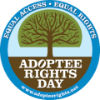Problem-solving usually requires creativity. I always think of that when I get into discussions about being anti-adoption. People always think of worst-case scenarios and wonder, "what about the children?" (I'm going to ignore the rampant corruption for now, which too often gives the lie to the feigned concern for the children.)
If we don't have adoption, how we will care for the children who are abused, abandoned, or otherwise cannot be cared for by their parents?
The mere fact that the only solution people can think of is adoption points to the lack of imagination necessary to solve various problems. We think the only solution to children who need love and care is to falsify family records and relationships.
Adoption itself, the language used and the way it is viewed by society, helps to mask the problems that give rise to it.
Adoption, as I've pointed out before, involves loss. A child loses his or her parents. Either they cannot or will not care for him or her. That is a loss.
When we "create" familial relationships through adoption, we cover over the loss, making grieving that loss more complicated. Instead of acknowledging that loss, allowing the child to grieve it, acknowledging the complexities that arise with new familial relationships - ones created by the law instead of by biology - instead of all of that, we pretend as though the problem has been solved.
Rather, all we've done is bury the problem. We complicate an already complicated situation. By insisting on using the term "mother" for the adoptive mother, we confuse and obscure what is already an emotionally dangerous arrangement.
Don't misunderstand me. An adoptive mother may be as important, or more so, emotionally as the biological mother. But she isn't the biological mother. But because we think in such simplistic terms, we co-op the term, and then insist that it doesn't indicate the biological relationship.
I get the impulse. We want to make the situation as easy for the child as possible. We don't want to confuse him or her. Tell the child "I'm your mommy now" makes it easy for the child in conversations with other kids. Trying to explain the intricacies of adoption to the child in terms that will make it possible for the child to explain it to other children is too much for the child to accept. I'm sure that's how we can explain it in terms of thinking about the welfare of the child.
But is it worth to save the child that heartache only to cause more lasting problems? Instead of facing up to the complexities in adoption, and trying to address them, we'd rather ignore them.
I really think we need to jettison adoption and it's problematic terminology and thinking. We need to recognize that there are many important people in our lives, from our childhood on. Parents are important. But so are teachers, aunts, uncles, grandparents, mentors, friends of the family, and the like. For some people, like myself, there were other people who were crucial in our lives. They weren't our parents (biologically-speaking) but they raised us and cared for us. Did they do it only because we call them my parents? No. They did it for ten months before they legally became my parents. Why gloss over our relationship with the same words we use for other relationships? Why pretend that I didn't lose my parents at a young age by calling other people my parents?
We need to think about this in more robust ways. We can invent institutions and language that honors the complex origin of those people we currently call adoptees. I have to believe we, as human beings, have more creativity than this.
Subscribe to:
Post Comments (Atom)


1 comment:
Post a Comment